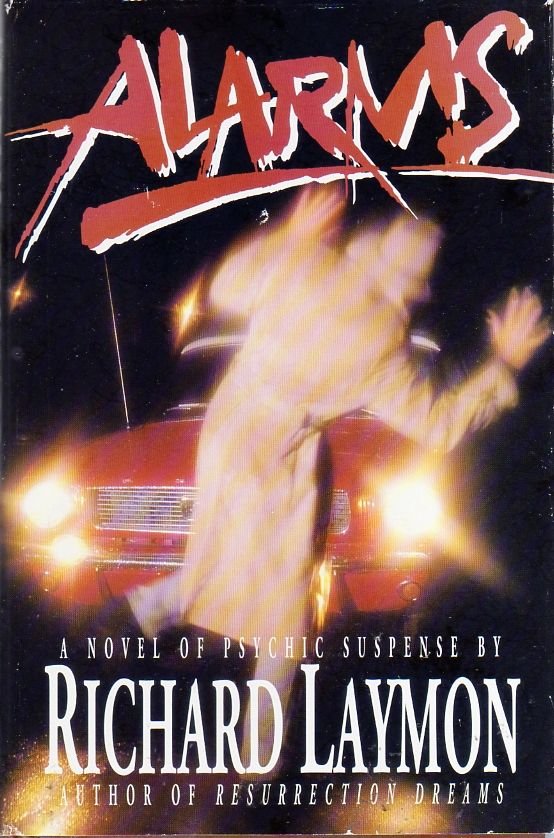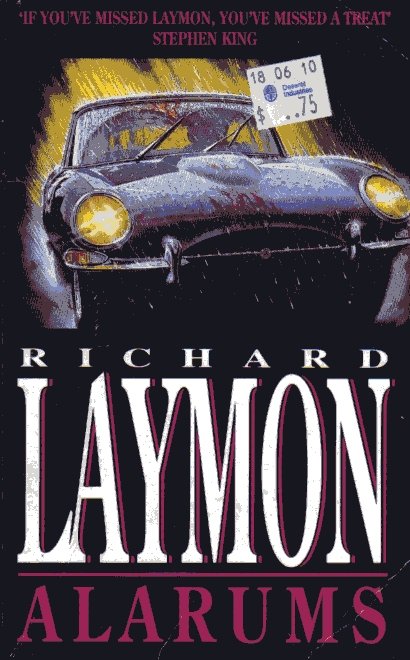
Melanie Conway might be psychic.
She sees visions, you understand. Only instead of premonitions that could help her change the future, Melanie sees terrible events right as they're happening. Last time it happened with this much clarity, her mother had been killed. Tonight, the vision, which always comes with what appears to be an epileptic seizure, is less-clear, but the outcome isn't: someone close to Melanie, someone she loves, has been run over by a speeding car. The victim might be her father, or it could be her sister, Penelope. Either way, she has to know for sure.
Her boyfriend Bodie, who witnessed Mel's seizure, is only to happy to help. Back at his apartment, Mel dials first her father, and then her sister. No one picks up either time. Frantic for answers, the pair embark on an all-night, cross-country drive from their small Arizona college to Mel's home town of Los Angeles, California. They arrive to find Mel's vision was all too true: her father lies, comatose, in the hospital while his much younger wife Jodie waits at home with family lawyer friend Harrison for news of his recovery. And while Penelope is fine physically, Bodie and Mel discover she's having problems of her own: a phone stalker who leaves perverse messages on her answering machine, explaining in graphic detail just what he'd love to do to the pretty young writer.
The longer Bodie hangs around the family, the more drawn into the tangled web which seems to weave itself all around them. Mel is convinced her step-mother was behind the hit-and-run job done to her father. Penelope is convinced her psycho stalker knows where she lives and plans to pay her a visit some time soon. Jodie is strangely evasive. Harrison may be more than just the family's legal counsel. And Bodie? Well, he's feeling a familiar stirring in the loins for Melanie's damsel-in-distress sister...
Alarms is a complete and total clusterfuck of a book -- and I don't mean that in a good way.
Billed on the cover as "a novel of psychic suspense", the truth is that Melanie's visions are a completely minor aspect of the novel: they're a plot device to set the story on its rails and give it a push downhill to get it going, and that's it. They're barely given mention afterwards, except when Laymon twists the story to make Mel look like a complete psycho bitch. She very well may be a complete psycho bitch, but while Laymon starts the story off with a bang (Mel having her seizure while performing on-stage with the college orchestra), the whole "psychic" part of the story disappears almost immediately. If the book's supposed to be a bottle rocket (which, at a mere 214 pages in my hardcover, it certainly flies by like one), the "psychic suspence" is little more than the fuse igniting the gunpowder.
Laymon's one of my favorite horror writers, but he was far from perfect, and unfortunately Alarms is one of the weakest novels in his canon. Despite being published in 1992, well over a decade after he made his splash fiction debut with 1980's The Cellar, Alarms reads like a slap-dash free-form nightmare where not even Laymon himself knew where it was going.
To be fair, an awful lot of Laymon's work was written in this way, a fact to which he freely confesses in his autobiography, A Writer's Tale. And it is this style, with its roller-coaster-rhythm, anything-can-happen vibe, which makes his work so entertaining. But it's only entertaining when the destination feels worthy of the journey, and here, what we're treated to is a lot of back-and-forth, will-they-or-won't-they, is-the-crazy-girl-really-crazy filler.

There's nothing wrong with some filler, when it's used to good measure, to slow a narrative down a bit and let the reader catch a breath. And I've read enough of Laymon's literary output to know he can wield filler the way Jason wields a machete: slow, tense, with no doubt he's going to get his prey. But that's not how he does it here -- instead, we're treated to a B-plot involving Penelope's telephone stalker which goes absolutely nowhere and pays zero dividends by the novel's closure, two female characters so frequently in need of male rescue you'd think you were reading a 60's Gothic, and a male protagonist who should have thrown up his hands and divested himself of the entire Conway clan at about the fifty page mark.
Nobody in Alarms is the least-bit likeable. Nobody in Alarms is the least-bit interesting. Neither of the two plot lines Laymon juggles is at all exciting. Even Laymon's trademarks of horny male protagonist ogling the pretty girls and the amount of time they spend running around in their underwear or unclothed comes off as so much adolescent male wish fulfillment nonsense. Nobody in Alarms behaves at all like a real person. There's a lot of violence, a lot of weirdness, a lot of nudity and smutty thoughts as Penelope and Bodie play the will-he-betray-Melanie-or-not head game. But there's no charm, and very little of Laymon's wit (a bit of foreshadowing to the WTF?-esque ending is about it), to hold the project together.
There is a nice twist at the book's conclusion, but it's a setup that works far better as a short story than a full-length novel. If Alarms was fifty pages of build-up with two pages of twist-the-knife ending, I'd applaud it; expecting a reader to slog through 212 pages of one-damn-thing-after-another for the same two-page reward is just sadistic.

Maybe this was an early story of Laymon's he pitched and was told to work into a full-length novel. Maybe it was something he churned out to fulfill a contract. Maybe it was something he wrote much earlier in his career, which finally got published after he'd established himself as a solid mid-list author with a ten-year portfolio to back him up. Or maybe Laymon just did what he almost always did: wrote by the seat of his pants, burning through typewriter ribbon like a literary arsonist, not caring who else got singed along the way. We'll likely never know.
What I do know is there's so little of what made Laymon feel like, you know, Laymon here that I struggled through it based only on the fact it bears his name. Super-fans will likely do the same and, tastes being what they are, I'm sure someone, somewhere, holds this up as their favorite of his works. But as much as I respect the man, and his hustle, and his insane output over an all-too-short career, there are many other novels I would recommend over this one.
Two out of five stars, and even then for Laymon collectors and completionists only.
You should consider sharing these in Hive Book Club as well! I bet the folks there would love your content.
I didn't know about this group. Next review I write will go up in there for sure. Thanks for the suggestion, @oblivioncubed. :)
Happy to help!
Congratulations @modernzorker! You have completed the following achievement on the Hive blockchain and have been rewarded with new badge(s) :
Your next target is to reach 71000 upvotes.
You can view your badges on your board and compare yourself to others in the Ranking
If you no longer want to receive notifications, reply to this comment with the word
STOPCheck out the last post from @hivebuzz:
Support the HiveBuzz project. Vote for our proposal!
No matter how the book panned out to be, it was an extremely entertaining review to read, while a small thunderstorm is taking place outside my house on a hill in the Portuguese countryside.
Cheers, Michael!